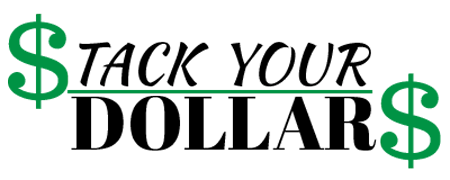Welcome to Stack Your Dollars, where our mission is to empower you with the knowledge necessary to enhance your financial literacy and take control of your future. While this personal finance website is dedicated to providing valuable insights, it’s important to acknowledge that I am just one individual with limitations. I cannot claim to possess all-encompassing knowledge nor cover every aspect of budgeting.
Moreover, recognizing that my teaching approach may not resonate with everyone, I sought assistance from various finance bloggers. After all, diversity in perspectives and methods is key to ensuring that you receive the most comprehensive guidance. In order to enrich your financial journey, I’ve collaborated with these finance bloggers who are eager to share their best advice along with a relevant post to aid you in achieving your financial goals.

Budgeting Blogs
In no particular order, here are 16 blogs that serve as valuable resources for learning about budgeting. These budget bloggers have generously shared their top financial advice, accompanied by informative posts for you to glean insights from. Additionally, I’ll be providing my commentary on each, offering a well-rounded perspective on their contributions.
1. What Anika Says

Advice: “Make budgeting fun. You can do so by rewarding yourself for achieving certain goals. For instance, reward yourself with a dinner at your favorite restaurant if you stick to your budget for the whole month. This will give you a reason to look forward to budgeting and not find it strict by limiting yourself too much.” – Anika Jindal
In one of Anika’s posts, she shares eight practical tips to help individuals adhere to their financial plans. Notably, the advice on reducing shopping trips and planning meals stood out to me. Following these tips enabled me to successfully stay within my $300 monthly grocery budget, reducing my expenses to as little as $200 per month.
2. Time in the Market

Advice: “Imagine a life with less stress, more flexibility, and the potential to retire early. Then ask yourself… Is spending money on “X” worth giving that up? That’s my easy trick to making budgeting work for many. The reality is that budgeting has to be a long-term commitment based on the belief that giving up something today will allow you more happiness in the long-term. Once you realize that, budgeting becomes simpler. It’s often unbelievable how little we use the items we buy and how easy it is to spend hundreds of dollars on something that will just sit on your shelf after a few hours of use. Budgeting has to become about smart long-term purchases because if it’s not, it limits a smart, long term lifestyle.” – Jarek
Jarek delves into the concept of compound interest, explaining how it allows money to grow exponentially over time. His detailed explanation, complemented by helpful graphics, simplifies the often complex notion of compound interest. Understanding this financial principle, as Jarek emphasizes, is crucial for making informed investment decisions and cultivating a smart, long-term lifestyle.
Link: The First $100,000 is the Hardest – the Miracle of Compound Interest
3. Thrifty Frugal Mom

Advice: “Don’t ignore little expenses. That $1 here and there adds up way more quickly than you often realize!”
In her journey to pay off a $90,000 mortgage in just five years, the Thrifty Frugal Mom emphasizes the fundamental principle of living simply and making do with less. Her methods include adopting a frugal lifestyle, which involves creativity, such as purchasing a fixer-upper and finding innovative ways to cut costs. This showcases that financial success often stems from a combination of disciplined spending and resourcefulness.
Link: 10 Things That Helped Us Pay Off Our $90,000 Mortgage In 5 Years
4. Strict Money Mastery

Advice: “Find your “why” with money. Associate pain to anything that doesn’t align with your “why”.” I believe finding a “why”, or a personal drive for accomplishing some type of goal is what sets people up for success or failure in achieving that goal. Anyone could set some type of goal but what’s the purpose of the goal?
Someone could set the goal to lose weight but if it doesn’t have a “why” behind it, it most likely won’t be achieved. However, if my “why” is that I want to lose weight to set a good example for my kids, feel better every day so I have the energy to play with my kids and live a long healthy life where I get to see my kids grow up and become adults, this is a “why”. Now, if you don’t accomplish this goal it means emotional pain for you because you know that you’re failing your children.
Making money isn’t a goal. What you can do with that money is the goal. Setting up a budget is pointless if you don’t know why you’re setting it up. Creating clearly defined financial goals with savings/budgeting is critical to the success of the budget. You could set a goal of saving $500 a month in a savings account, but what for? If you create a “why” you’re saving $500 a month (i.e. because I need $3000 to take my kids to Disney), you’ve just created a “why”.”
Being in the military community, I make a deliberate effort to keep things simple. This helps to avoid the headaches of dealing with an excess of possessions when it’s time to relocate. The post succinctly outlines the advantages of leading a simpler life, highlighting its potential to save both time and money. The underlying message is clear: having fewer things ultimately leads to having more in various aspects of life.
5. Debt Free Forties

Advice: “People often fail at budgeting because they’re using “all or nothing” thinking. Instead, it’s essential to focus on the small victories and progress made every day. Budgeting isn’t about doing it 100% right all the time. It’s about spotting the slip-ups and bumps in the road and adjusting. Learning to be flexible and open to adjustments are your most significant assets to help you stick with a budget.” – Tana Williams
In addition to budgeting wisdom, Tana shares practical frugal living tips in one of her posts. Notably, the tip about buying your own modem stands out as a cost-saving measure. This resonates with personal experience, as investing in a modem can lead to long-term financial benefits and improved service quality, eliminating the hassle of intermittent internet connectivity.
6. Intentional Saver

Advice: “Being “bad” with money or a poor budgeter is not a personality trait. It’s a skill you can hone and become good at by changing your mindset around money, and by creating a budget that’s personal to your situation and one that motivates you to want to stick to it. I have found success by budgeting every single little thing I can think of, so I have no surprises. You may find a less detailed budget with higher-level categories works for you. Just keep tweaking until you find something you can stick with.” – Stephanie Schill
In addition to budgeting tips, Stephanie’s post offers practical advice on saving money while eating out. Notably, the post features various strategies, with a specific mention of #10, which resonates with personal experiences of saving money during cheat days at specific restaurants like Chick-Fil-A. This demonstrates how practical tips can align with real-life scenarios, making financial management more relatable and achievable.
7. Budgets Made Easy

Advice: “Focus on just one thing at a time. It’s less overwhelming and you’re more likely to follow through with it.” – Ashley Patrick
Ashley’s personal story adds a compelling touch to her financial insights. Facing a debt of $45,000, comprising student loans, a car loan, and a 401(k) loan after a job loss, Ashley shares her journey of overcoming this financial setback. Her post serves as both inspiration and a practical guide, demonstrating how dedication and strategic financial planning led her family to pay off the debt in a remarkable 17 months. This success story aims to motivate and reassure others that they too can overcome financial challenges with determination and a structured plan.
8. Frugal Fortunes

Advice: “Always remember… If you borrow and spend beyond your means today, you’re borrowing from your future self at a higher cost. But if you budget and invest your savings, you’re giving your future self a raise.” – Brian Kehm
Brian’s post breaks down a clear path to financial freedom into three essential steps: saving money, making more money, and investing wisely. These building blocks serve as a practical guide for anyone aiming to achieve financial success.
Link: Path to Financial Freedom in 3 Simple Steps
9. The Remote Mom

Advice: “The best advice I can give is to make your money work for you. Instead of putting most of your money towards savings, find ways to invest your money to make it grow. By creating more income, you will find it easier to budget and pay off your debt.” – Suzanne
Suzanne provides a valuable list of 25 items to avoid purchasing due to their convenience, despite being money wasters. Some of these items also double as effective money-saving strategies, a point that aligns with my own advice. Additionally, I’d like to emphasize the enduring usefulness of your local library. Why expend hundreds on books when you can effortlessly download them for free through their apps?
Link: 25 Things To Stop Buying To Save Money
10. Cash for Tacos

Advice: “Know your why. Why do you want to budget? Do you want to get out of debt, save more money, or simply feel better about your finances? Everyone’s why will be different.
But I strongly believe that for any budget to be successful, a budgeter needs to know why they want to budget. When you know why you want to budget, you will be that much more likely to stick to the budget. This is because your “why” fuels your motivation and inspires you to keep budgeting even when you want to throw your budget out the window.” – Melody Fanslau
In addition to her advice, Melody shares a personal story that vividly illustrates the impact of taking control of one’s finances. Her experience, including the stress of uncertain bill coverage and the subsequent relief from deciding to take charge, adds a relatable and encouraging dimension to her financial insights. Melody not only advocates for taking control of your money but also demystifies the process, making it accessible and achievable for others.
Link: Take Control of Your Money: What Does it Mean and How to Get Started
11. The Savvy Couple

Advice: “Change your money mindset when making purchases. Instead of viewing the items’ cost in dollars. View the actual cost in your precious time you have to give away at work in order to afford it.” – Brittany Kline
This change in perspective is exemplified by the example of a $30 meal not being just a monetary expense but equivalent to 2-3 hours of work. The core concept is that the true cost of anything isn’t just the money paid; it’s the time exchanged for it. This post serves as a guide to help individuals rewire their thinking, considering purchases in terms of time versus money. By adopting this mindset, individuals can make more informed decisions, potentially leading to significant savings.
Link: We Don’t Buy Things With Money, We Buy Them With Precious Time From Our Lives
12. iHeartBudgets

Advice: “When creating a budget, structure it in 4 sections: Income, Bills, Daily Spending, and Savings. This allows you to focus on improving one section at a time. Income can increase with raises, promotions, or side hustles. Bills can be negotiated or optimized by finding better deals on your services. Daily spending can be controlled with daily decisions to stop spending on things that don’t matter to you. These changes can help you to increase your savings toward your goals.” – Jacob Wade
Jacob also shares five simple steps that propelled him from debt to a six-figure net worth. One noteworthy tip he mentions is the utilization of a Roth IRA, highlighting the financial benefits, especially for new homebuyers who can withdraw up to $10,000 (including interest returns) without penalties after a specific period. This mix of structured budgeting advice and personal success tips contributes to a comprehensive approach to financial well-being.
13. Cents + Purpose

Advice: “When it comes to budgeting, keep it simple. Overcomplication leads to confusion and confusion eventually leads to failure. Create a system you can use week after week to effectively track your spending, maintain your budget, and work towards your financial goals.” – Kristin Stones
Kristin’s personal story adds a practical dimension to her advice. In detailing the steps she and her husband took to pay off $54,500 in just 20 months, she imparts valuable insights. One crucial takeaway is challenging the conventional view of getting money back from tax returns as a positive occurrence. Instead, Kristin suggests viewing it as essentially providing an interest-free loan to the government, urging individuals to consider more advantageous uses for that money. This blend of practical budgeting advice and real-life success stories contributes to a relatable and actionable approach to financial management.
14. Money Bliss

Advice: “Start your budget based on the bare essentials. This bare-bones budget will make sure the necessities in life are taken care of like housing, food, medical, and transportation. Next, take out how much you want to save. Then, slowly add on the fun spending and discretionary spending.
That way you will always keep your spending below your expenses. This makes budgeting work the best.” – Kristy
Kristy’s bare-bones budget aligns with broader financial goals, including debt reduction, increased savings, and the establishment of an emergency fund. By adopting this method, individuals are better positioned to break free from the cycle of living paycheck to paycheck, fostering a more stable and secure financial foundation.
15. How To FIRE

Advice: “Find the best budgeting tool that works for you. Don’t be afraid to try several before settling on one or many tools. If you force yourself to stick with one that you hate or find difficult to use, you will be less likely to continue sticking with your budget.” – Samantha Hawrylack
In addition to her advice, Samantha shares various tools that can assist individuals in keeping track of and reaching their financial goals. Among these, spreadsheets and the traditional pen-and-paper method stand out as her favorites. This acknowledgment of diverse tools reflects the recognition that there is no one-size-fits-all approach to budgeting, encouraging individuals to explore and adopt the tools that align with their personal preferences and needs.
Link: The Best Budgeting Tools to Reach Financial Independence
16. Cara Palmer

Advice: “Buy a used car for $6,000 or less. You can find a reliable vehicle in that price range and keep your payments low. The average car payment is over $550, that’s a lot of money. Use the money that you save on car payments to pay down your debt as quickly as possible.” – Cara Palmer
Cara’s tips on paying off debt when facing financial constraints align with the notion that it’s not just about how much money one makes but also about how much can be retained and utilized wisely. This emphasis on frugality and prioritizing debt reduction regardless of income level provides actionable insights for individuals seeking financial stability.
Conclusion
In our exploration of 16 budgeting blogs, we’ve uncovered a treasure trove of financial wisdom. From the importance of understanding your “why” in budgeting to adopting a minimalist lifestyle, each blogger brings a unique perspective. Emphasizing simplicity, these bloggers stress that overcomplicating budgeting can lead to confusion and failure.
Practical advice, such as Cara Palmer’s frugal car ownership tips and Brian Kehm’s insight on the long-term consequences of borrowing, offers tangible ways to impact daily financial choices. Real-life success stories, like Ashley Patrick’s journey to debt freedom, add a personal touch.
As we conclude, it’s clear that financial education is a powerful tool. Whether you’re considering a bare-bones budget or reevaluating your spending mindset, there’s a wealth of knowledge for a more secure financial future. Let’s embark on the journey of financial literacy together, sharing insights and fostering discussions.
P.S. If you’re seeking some motivation to kickstart your savings journey, don’t forget to check out the free money savings challenges—a small step towards a more financially empowered tomorrow!

